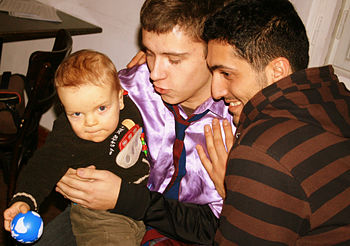Christian who supported same sex marriage have been duped
 |
| Gay Couple with child (Photo credit: Wikipedia) |
Both before and after the Supreme Court’s ruling in Obergefell v.
Hodges, some Christians argued that allowing same-sex couples to marry is not
inconsistent with traditional Christian teaching on marriage.
At the heart of these arguments is the assertion that same-sex
relationships are, to borrow a phrase from gay writer Andrew Sullivan,
“virtually normal.” That is, same-sex relationships are, with one very obvious
exception, not all that different from traditional marriages. Thus, just as the
Supreme Court held that similarly-situated couples should be treated equally
under law, similarly-situated couples should be treated equally in our
churches.
The problem is that same-sex couples and opposite-sex couples are
not nearly as alike as those making these arguments would have us believe.
This reality was amply demonstrated in a recent broadcast of
“Weekend All Things Considered.” Host Arun Rath spoke to J. Bryan Lowder of
Slate, who worried about the impact of the Court’s decision on gay culture.
By “gay culture,” Lowder wasn’t talking about a particular fashion
sense and a fondness for Judy Garland. What he had in mind was the ability to
“imagine different ways of being in romantic relationships and loving.” For
some gays and lesbians, this “meant monogamous relationships that looked
exactly like a married couple . . . [without] the legal imprimatur of the
state. But for other people, they had many different kinds of arrangements.”
Emphasis on many.
Lowder was concerned about losing “some of that imagination that
the gay community has had in the past to think about how to live in different
ways and . . . offer a critique to straight culture of how we can arrange our
romantic lives.”
In other words, LGBT folks are just like straight folks except
when they’re not. They want to be married like everyone else, except when they
don’t want to be. They want to embrace bourgeois domesticity, except when they
don’t and, instead, prefer to use their imagination, as he put it.
Lowder is hardly an outlier. Last year, in a Daily Beast article
provocatively entitled “Were Christians Right About Gay Marriage All Along?”
gay activist Jay Michaelson acknowledged that there “is some truth to the
conservative claim that gay marriage is changing, not just expanding,
marriage.”
Michaelson cited a 2013 study finding that “about half of gay
marriages surveyed . . . [are] not strictly monogamous.” He called this fact
“well-known in the gay community,” adding that “we assume it’s more like
three-quarters” that are not monogamous. They are, to cite a now-popular
phrase, “monagam-ish.”
Michaelson admitted that his straight friends who believed that
they “were fighting for marriage equality, not marriage redefinition,” felt
“duped.” But he was unapologetic. In his words, “actual monogamy has never been
an actual norm,” as opposed to an ideal.
Michaelson seems to think that because some men have been
unfaithful, monogamy should not be an expectation of marriage. The vast
majority of women, by the way, would undoubtedly disagree.
This brings to mind an exchange between Andrew Sullivan and
conservative columnist Mona Charen more than 20 years ago. In response to
Sullivan’s claim that marriage would domesticate gay men’s sex drives, Charen
replied that marriage doesn’t domesticate men, women do.
This, my friends, is sexual complementarity in a pithy nutshell.
The sexes are different, and each promises the other something different that
will contribute to their union and the wellbeing of their offspring.
Frankly, Christians who support same-sex marriage have been had.
The question is: Now that they know what’s really going on, will they change
their minds?

